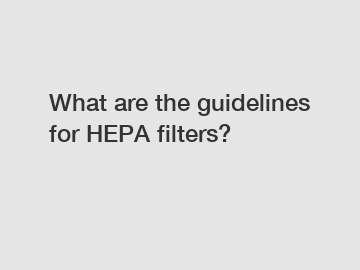Dec. 15, 2023
Environment
With competitive price and timely delivery, Futai sincerely hope to be your supplier and partner.
HEPA filters are widely recognized for their effectiveness in improving indoor air quality by removing airborne particles. However, many people are often unsure about the guidelines for using and maintaining HEPA filters. In this article, we will provide a comprehensive overview of the guidelines for HEPA filters, including their origins, the process of validating their efficacy, and the significant impact they have on air purification.
HEPA filters, which stands for High-Efficiency Particulate Air filters, are designed to capture particles as small as 0.3 microns with an efficiency of 99.97%. The guidelines for HEPA filters are based on the rigorous testing and certification standards set by organizations like the Institute of Environmental Sciences and Technology (IEST) and the International Organization for Standardization (ISO). These guidelines ensure that HEPA filters meet strict criteria to provide consistent and reliable performance in air purification.

The testing process involves challenging the HEPA filters with particles of known sizes and measuring their efficiency in capturing these particles. The filters must demonstrate an efficiency of 99.97% or higher for 0.3-micron particles to be considered true HEPA filters. This standardized testing procedure ensures that consumers can rely on the accuracy and effectiveness of HEPA filters in removing a wide range of airborne pollutants, including allergens, dust, mold spores, and even some bacteria and viruses.
The guidelines for HEPA filters extend beyond initial validation of their efficiency. Proper maintenance and replacement are essential to ensure optimal performance. It is generally recommended to replace HEPA filters every 12 to 18 months or when they become visibly dirty or clogged. Regularly cleaning or replacing pre-filters, which capture larger particles and prolong the life of HEPA filters, is also crucial. Following these guidelines helps maintain the efficiency of HEPA filters and ensures the continued removal of airborne pollutants.
The significance of adhering to the guidelines for HEPA filters lies in the critical role these filters play in improving indoor air quality. Indoor air pollution has been linked to various respiratory and cardiovascular health issues, including allergies, asthma, and other respiratory diseases. By effectively removing airborne particles, HEPA filters contribute to creating a healthier and cleaner indoor environment, particularly for individuals with allergies or respiratory conditions.
Moreover, the impact of HEPA filters goes beyond individual health benefits. With increasing awareness of the importance of indoor air quality, many commercial and public settings have adopted HEPA filters in their ventilation systems. These filters are commonly used in hospitals, laboratories, and other high-risk environments where maintaining air purity is essential. By following the guidelines for HEPA filters, these establishments can ensure the maintenance of a sterile and pollutant-free environment.
In conclusion, the guidelines for HEPA filters not only dictate the initial testing and certification procedures but also encompass maintenance and replacement protocols. These guidelines are rooted in standardized testing methods and play a crucial role in validating the efficiency of HEPA filters. Adhering to these guidelines ensures optimal performance and contributes to improved indoor air quality, benefiting both individuals and commercial settings. So, if you are looking for a reliable and effective air purification solution, following the guidelines for HEPA filters is essential.
For more information, please visit Air purification activated carbon filter element.
If you are interested in sending in a Guest Blogger Submission,welcome to write for us!
All Comments ( 0 )